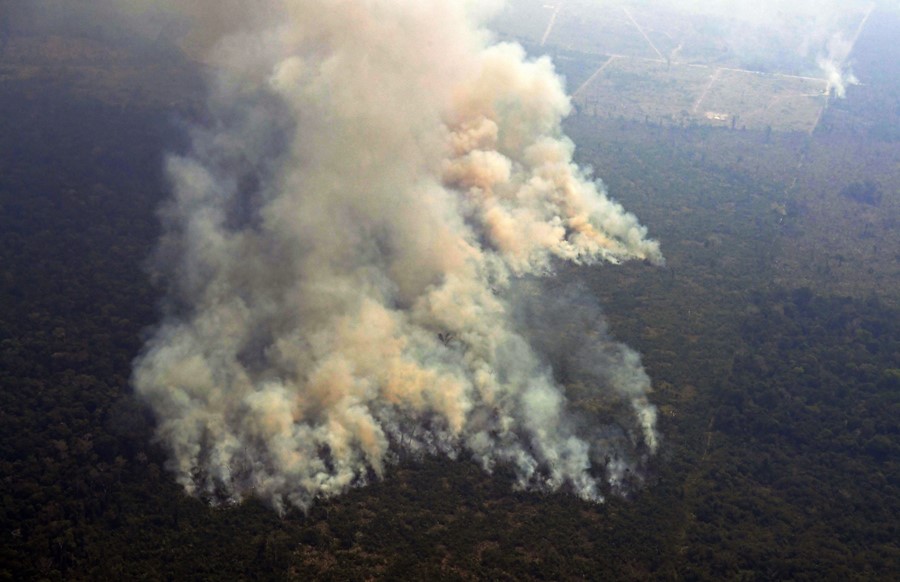In her latest books column, Ana Kinsella questions the role of literature in the face of climate change
I’ve never had problems getting to sleep, but lately I’ve been finding it hard. When I close my eyes, I see a carousel of distressing words and images from the news and the internet. Historic floods. Record-breaking heatwaves. The Amazon, now, on fire. The drumbeat is constant and once you hear it, it is very difficult to turn it off.
The feeling started in earnest in January, when I read John Lanchester’s latest novel The Wall. It took me ages to get through it. The novel is set in the near-future, when rising sea levels have driven the UK to a form of eco-fascism where the young are forced to patrol a sea wall for two years, guarding the land from desperate refugees who arrive from the flooded world by boat. It is ceaselessly bleak – the fever dream of an author driven mad by imagining various worst-case scenarios.
But I am a glutton for punishment. So I followed The Wall with more apocalyptic dystopia. I watched Alfonso Cuarón’s film Children of Men. It was like agitating a scab. I read Severance by Ling Ma, a lighter choice, though still set against the backdrop of a fungal plague that destroys our world. Eventually I found Station Eleven, Emily St John Mandel’s elegant epic of a world after a catastrophic flu pandemic. Reading, for me, has always been a form of pure entertainment, a way to escape or to educate myself. Now I was looking to books for help. And if the books couldn’t help me, I thought, what was the point?
Joan Didion’s oft-quoted line says that we tell ourselves stories in order to live. I’ve always read that as: we tell ourselves stories in order to make sense of our lives. A story is a way of putting order on the chaos of the world. There is not much more chaotic than burning rainforests, melting glaciers. Right now, the world is on fire and our political systems lack the flexibility to accommodate the action we’d need to halt climate change (for example, an end to GDP as a measure of a country’s health, or a cut to our working hours in such a way that means we are no longer reliant on convenience food and Amazon Prime deliveries).
What can we do about it? Day to day I feel useless in the face of climate change. I hate the feeling. I am desperate, at times, to blot it out. But what we can do is turn towards it – feel all the pain and shame and sadness. We can continue to hope that something will survive the fire. We can situate ourselves in a wider context – see ourselves as actors in the larger picture. We can feel connected to each other. This is what literature does. It might even be what literature is for, if it is for anything. Humans have been doing this for centuries. Across the world, in every culture, the ability to spin a yarn, whether for entertainment or education or information, is something that has value. Books are not the only crystallisation of the human need for narrative, but they’re one of the clearest and most pervasive we have. Writing something down, printing it, disseminating it as a book – it’s perhaps the most effective way to give something sticking power. Think of any book you’ve read that made a deep impression on you, that lingered long after the fact. Any book that showed you something new. Any book you pressed into a friend’s hands, saying, This one is definitely going to mess you up. Stories are not just how we make sense of the world: they are the sense, and they are the world.
In Station Eleven, a rag-tag band of actors travel the devastated and violent settlements of North America performing poorly remembered Shakespeare. They do it because, in the mantra of the novel, “survival is insufficient”. Even in the wake of destruction, there must be something more that ties us together. A similar idea lies at the heart of The Wall – when we have nothing left, we still have the stories we tell. Nothing I can read right now is going to soothe me, but it can remind me of something outside myself. A burning world can still hold beauty. Stories will always have to be told. Right now, to have the freedom to read or write them feels like a luxury.
Currently, I’m trying to write a novel. It has nothing to do with the end of the world. I do most of my writing at my desk, and I break at lunchtime and listen to the radio, where the world news tells me stories from Bangladesh and Brazil, cancer-causing pollution and rotting coral reefs. It is overwhelming. I close my laptop and instead look out the window at the communal gardens of my estate. I look for signs that the world is continuing as normal in some way: leaves turning brown, squirrels climbing trees. Eventually, when I’m ready, I reopen my laptop and keep writing.
